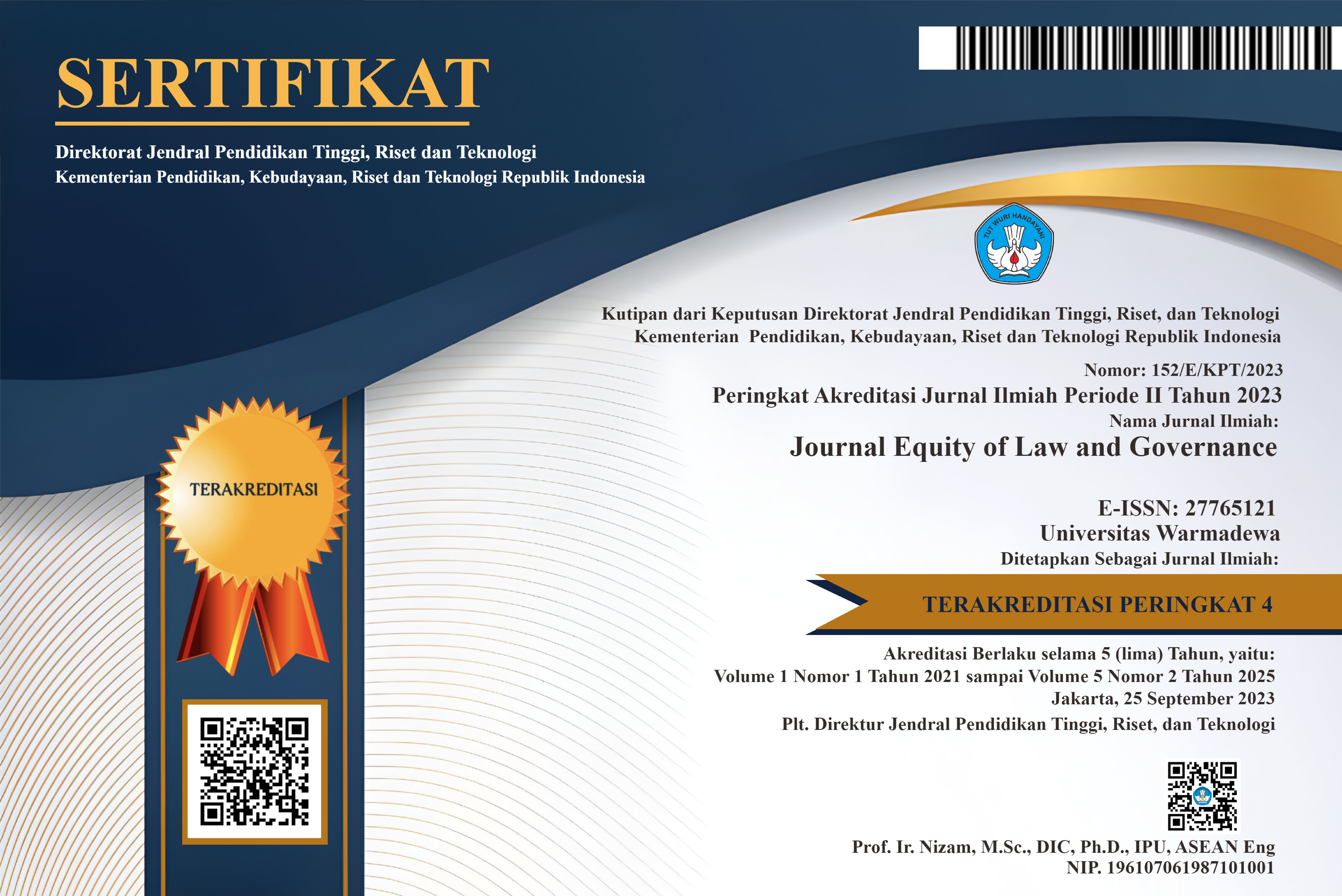Policy of Increasing Value-Added Tax from The Perspective of Maslahah Mursalah (Analysis of Act. No 7 Of 2021 Concerning Harmonization of Tax Regulations)
Abstract
Tax regulations in Indonesia have undergone many changes. The main factors are the global economy, basic needs of the country, development needs, and others. So it requires the community to work together to build the country through taxes. This research aims to find out the legal basis of the VAT increase policy, then find out the impact of the increase policy. And then how is the VAT increase policy if reviewed from the perspective of maslahah mursalah. In this study, the author uses normative research methods, with the Conceptual Approach and Statutes Approach. This research is descriptive analytical, data is collected through document studies, literature studies, and then analyzed using deductive thinking logic. The results of this study show that the increase in VAT rates is based on Law Number 7 of 2021 concerning the Harmonization of Tax Regulations (HPP Law). From the perspective of maslahah mursalah, which focuses on the benefit or public interest, this policy can be seen as an effort to achieve the welfare of the community at large. The increase in VAT has the potential to bring significant benefits by increasing the state budget that can be allocated for infrastructure, education, health, and other social programs, in line with the principle of public benefit. However, negative impacts such as inflation and a decrease in people's purchasing power, especially for low-income groups, need to be anticipated.
References
Agustina, N. Z. (2021). Dampak Perubahan Tarif Pajak Penghasilan Badan Dan. 158. https://doi.org/10.24034/j25485024.y2022.v6.i4.5359
Artikel, I. (2023). Bridging?: Journal of Islamic Digital Economic and Management ISSN?: 3025-9177 Dampak Peningkatan Penjualan Pada PT XYZ. 1(1), 192–197.
Aryani, L., & Tambunan, M. R. U. D. (2022). Catatan Atas Formulasi Kebijakan Perubahan Tarif Pajak Pertambahan Nilai (Ppn) Di Indonesia. Dialogue?: Jurnal Ilmu AdministrasiPublik,4(2),362–381. https://doi.org/10.14710/dialogue.v4i2.14893
Majid, F., Sholikhah, H. S., & Lintang, S. (2023). Dampak Kenaikan Tarif Pajak Pertambahan Nilai pada Masyarakat Indonesia. Jurnal Mahasiswa Akuntansi UNITA, 2(2), 92–97. https://doi.org/10.36563/jamanta_unita.v2i2.701
musthafa & siti romlah. (2022). 3(1), 59–84.
Novianto, R. W., Ramadhan, R. D. P., Azzahra, S. F., & Irawan, F. (2023). Menelaah Kenaikan Tarif Pajak Pertambahan Nilai Ditinjau dari Asas Keadilan. Jurnalku, 3(2), 187–195. https://doi.org/10.54957/jurnalku.v3i2.454
Penyedia, D., & Negeri, L. (2020). Alternatif Kebijakan Pajak Pertambahan Nilai Atas Konsumsi Atau Pemanfaatan Konten Dan Jasa Digital. 1(2).
Permata Gunawan, F., & Sofiani, V. (2023). Pengaruh Kenaikan Tarif Pajak Pertambahan Nilai (PPN) Dan Biaya Bahan Baku Terhadap Omset Penjualan Pada PT Buana Raya Lestari. Journal of Economics and Business UBS, 12(5), 2706–2721. https://doi.org/10.52644/joeb.v12i5.469
Perpajakan, H. (2022). Dampak Pengenaan Ppn 11 % Terhadap Pelaku Dunia Usaha Sesuai Uu No . 7 Thn 2021 Tentang Harmonisasi. 1(April), 391–404.
Pertambahan, P., Ppn, N., & Umami, N. N. (2022). nikmatul. 2(9), 1–13.
Rifqi Nailul,. (2019). Siahaan, A. (2023). Menelaah Kenaikan tarif PPN 11% di Indonesia. Indonesia Journal of Business Law, 2(1), 24–28. https://doi.org/ 10.47709/ ijbl.v2i1.2029
Wesley, C., & Sitompul, G. O. (2024). Pengaruh Kebijakan Kenaikan PPN 11 Persen dan Penagihan Pajak dalam Memenuhi Kewajiban Perpajakan Pelaku Usaha. 5(3), 1625–1642.
Wijayanti, W. (2018). Analisis dampak kenaikan tarif pajak pertambahan nilai hasil produksi. Universitas Brawijaya, 2, 6. http://repository.ub.ac.id/id / eprint/ 165450/1/ Wiwit Wijayanti.pdf
 Abstract viewed = 13 times
Abstract viewed = 13 times
 pdf downloaded = 26 times
pdf downloaded = 26 times













